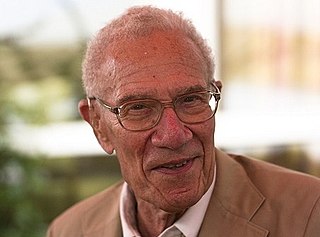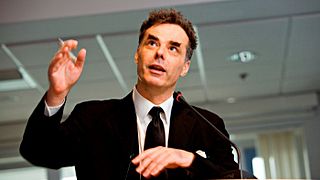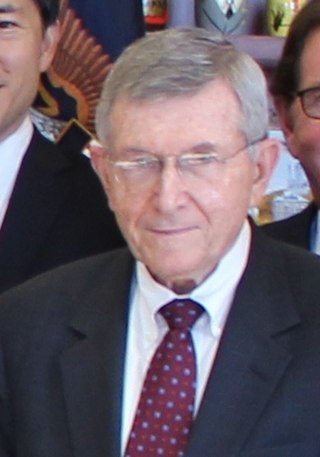Related Research Articles

Robert Cox Merton is an American economist, Nobel Memorial Prize in Economic Sciences laureate, and professor at the MIT Sloan School of Management, known for his pioneering contributions to continuous-time finance, especially the first continuous-time option pricing model, the Black–Scholes–Merton model. In 1997 Merton together with Myron Scholes were awarded the Bank of Sweden Prize in Economic Sciences in Memory of Alfred Nobel for the method to determine the value of derivatives.

Robert Merton Solow, GCIH is an American economist whose work on the theory of economic growth culminated in the exogenous growth model named after him. He is currently Emeritus Institute Professor of Economics at the Massachusetts Institute of Technology, where he has been a professor since 1949. He was awarded the John Bates Clark Medal in 1961, the Nobel Memorial Prize in Economic Sciences in 1987, and the Presidential Medal of Freedom in 2014. Four of his PhD students, George Akerlof, Joseph Stiglitz, Peter Diamond and William Nordhaus, later received Nobel Memorial Prizes in Economic Sciences in their own right.
Hirsh Zvi Griliches was an economist at Harvard University. The works by Zvi Griliches mostly concerned the economics of technological change, including empirical studies of diffusion of innovations and the role of R & D, patents, and education. In 2023 he had 126 publication listed in Web of Science and a Hirsch index of 49, which places him into 2% of most productive economics professors in the USA.

Richard Barry Freeman is an economist. The Herbert Ascherman Professor of Economics at Harvard University and Co-Director of the Labor and Worklife Program at Harvard Law School, Freeman is also Senior Research Fellow on Labour Markets at the Centre for Economic Performance, part of the London School of Economics, funded by the Economic and Social Research Council, the UK's public body funding social science. Freeman directs the Science and Engineering Workforce Project (SEWP) at the National Bureau of Economic Research (NBER), a network focused on the economics of science, technical, engineering, and IT labor which has received major long-term support from the Sloan Foundation.

David John Teece is a New Zealand-born US-based organizational economist and the Professor in Global Business and director of the Tusher Center for the Management of Intellectual Capital at the Walter A. Haas School of Business at the University of California, Berkeley.
Gene Michael Grossman is an American economist who is the Jacob Viner Professor of International Economics at Princeton University. He is known for his research on international trade, in large part focusing on the relationship between economic growth and trade and the political economy of trade policy. He is also known for his work on the environmental Kuznets curve.

Eric Stark Maskin is an American economist and mathematician. He was jointly awarded the 2007 Nobel Memorial Prize in Economic Sciences with Leonid Hurwicz and Roger Myerson "for having laid the foundations of mechanism design theory". He is the Adams University Professor and Professor of Economics and Mathematics at Harvard University.
The United States National Academy of Sciences' Board on Science, Technology, and Economic Policy (STEP) is a board of the United States National Academy of Sciences.
Frederic Michael Scherer is an American economist and expert on industrial organization. Since 2006, he continues as a professor of economics at the JFK School of Government at Harvard University.

Daniele Archibugi is an Italian economic and political theorist. He works on the economics and policy of innovation and technological change, on the political theory of international relations and on political and technological globalisation.

Abhijit Vinayak Banerjee is an Indian-born naturalized American economist who is currently the Ford Foundation International Professor of Economics at Massachusetts Institute of Technology. Banerjee shared the 2019 Nobel Memorial Prize in Economic Sciences with Esther Duflo and Michael Kremer "for their experimental approach to alleviating global poverty". He and Esther Duflo, who are married, are the sixth married couple to jointly win a Nobel Prize.

Alan David Lourie is a United States circuit judge of the United States Court of Appeals for the Federal Circuit.
Karen Rosel Polenske is an American regional economist specialized in energy, environmental, and infrastructure analyses, and input-output accounts and models, particularly at the subnational scale. She is currently the Peter de Florez Professor of Regional Political Economy at the Massachusetts Institute of Technology (MIT).

Dean Karlan is an American development economist. He is Professor of Economics and Finance at Northwestern University where, alongside Christopher Udry, he co-founded and co-directs the Global Poverty Research Lab at Kellogg School of Management. Karlan is the president and founder of Innovations for Poverty Action (IPA), a New Haven, Connecticut, based research outfit dedicated to creating and evaluating solutions to social and international development problems. He is also a Research Fellow and member of the Executive Committee of the board of directors at the Abdul Latif Jameel Poverty Action Lab (J-PAL) at the Massachusetts Institute of Technology. Along with economists Jonathan Morduch and Sendhil Mullainathan, Karlan served as director of the Financial Access Initiative (FAI), a consortium of researchers focused on substantially expanding access to quality financial services for low-income individuals.
Reinhilde Veugelers is a Belgian economist and Professor of Managerial Economics, Strategy and Innovation at the Katholieke Universiteit Leuven from Belgium, known for her research on science and innovation. She is also a scholar at Bruegel in Brussels and at the Peterson Institute for International Economics in Washington D.C.
Suzanne Scotchmer was an American professor of law, economics and public policy at the University of California, Berkeley and also a noted author on many economic subjects. She earned her B.A. from University of Washington magna cum laude in 1970, her M.A. in statistics from UC Berkeley in 1979, and her PhD in economics from UC Berkeley in 1980.
Heidi Williams is a Professor of Economics at Dartmouth College and Director of Science Policy at the Institute for Progress. She is a graduate of Dartmouth College, and earned her MSc in development economics from Oxford University and her PhD in Economics from Harvard University. Prior to Dartmouth, Williams was the Charles R. Schwab Professor of Economics at Stanford University and an associate professor at the Massachusetts Institute of Technology. She is a member of the National Bureau of Economic Research.
Michael D. Whinston is an American economist and currently the Sloan Fellows Professor at Massachusetts Institute of Technology. Previously he was the Robert E. and Emily H. King Professor at Northwestern University and is also a Fellow to the American Academy of Arts and Sciences and Econometric Society.
Mordecai Kurz is an economist whose research work has covered a variety of problems in economic theory and policy. He has written extensively on growth theory, game theory, the formation of beliefs, and the effect of market power on inequality and growth, and he has worked on various policy projects. He contributed to the design of minimum income guarantee experiments in Seattle and Denver from 1971 to 1975, and in Manitoba in 1974. He also served as a special economic advisor to President Carter’s Commission on Pension Policy in 1979.
Lisa M. Lynch is an American economist working as Maurice B. Hexter Professor of Social and Economic Policy at Brandeis University’s Heller School for Social Policy and Management and Director of the Institute for Economic and Racial Equity. She was previously Provost and Interim President of Brandeis University and Dean of the Heller School, a faculty member at Massachusetts Institute of Technology, Ohio State University, and University of Bristol, and a co-editor of the Journal of Labor Economics. She is a past chief economist of the United States Department of Labor, chair of the board of directors of the Federal Reserve Bank of Boston, and president of the Labor and Employment Relations Association.
References
- ↑ "Adam B. Jaffe". brandeis.edu. Retrieved 2014-01-28.
- 1 2 3 4 "ADAM B. JAFFE" (PDF). Retrieved 2023-02-02.
- ↑ "Citations". Google Scholar.